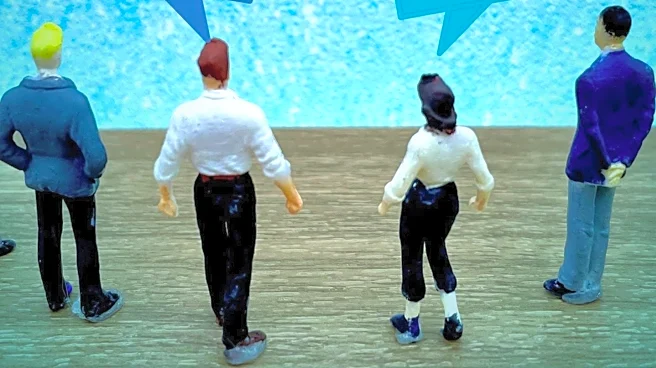What's Happening?
Miss Manners, a column by Judith Martin, Nicholas Martin, and Jacobina Martin, discusses the growing trend of one-sided conversations where individuals focus solely on themselves. The column highlights
a reader's concern about the lack of reciprocal dialogue in social interactions, noting that people often talk about their own experiences, such as travels and home renovations, without engaging others. This behavior is perceived as pretentious and is likened to social media habits where individuals broadcast personal achievements without fostering genuine conversation. Miss Manners suggests that this trend is not entirely new, drawing parallels to past practices like mimeographed Christmas letters, which similarly focused on self-promotion. The column advises readers to actively seek engagement by asking others for their opinions and sharing personal updates to encourage two-way communication.
Why It's Important?
The issue of one-sided conversations reflects broader societal changes influenced by social media and digital communication. This trend impacts social etiquette and the quality of interpersonal relationships, as meaningful dialogue is essential for building connections and understanding diverse perspectives. The emphasis on self-promotion can lead to superficial interactions, reducing opportunities for genuine engagement and collaboration. As social media continues to shape communication norms, there is a risk that traditional conversational skills may decline, affecting personal and professional relationships. Addressing this issue is crucial for fostering a culture of mutual respect and active listening, which are vital for effective communication in various settings, including workplaces, social gatherings, and community events.
What's Next?
Miss Manners suggests practical steps for individuals to improve conversational skills, such as directly inviting others to share their opinions and experiences. This approach can help counteract the trend of one-sided conversations and promote more balanced interactions. As awareness of this issue grows, there may be increased emphasis on teaching communication skills in educational and professional environments. Organizations and social groups might also implement strategies to encourage inclusive dialogue, ensuring that all participants feel heard and valued. These efforts could lead to a shift in social norms, prioritizing reciprocal communication and fostering a more connected and empathetic society.
Beyond the Headlines
The cultural perception of one-sided conversations as 'very American' highlights the potential for international misunderstandings and stereotypes. This behavior may be viewed as shallow by other cultures, affecting cross-cultural interactions and perceptions of American society. Addressing this issue could improve international relations and cultural exchanges by promoting more respectful and engaging communication practices. Additionally, the focus on self-promotion raises ethical considerations about authenticity and the impact of social media on self-perception and identity. Encouraging genuine dialogue can help individuals develop a more balanced view of themselves and others, contributing to personal growth and societal cohesion.










